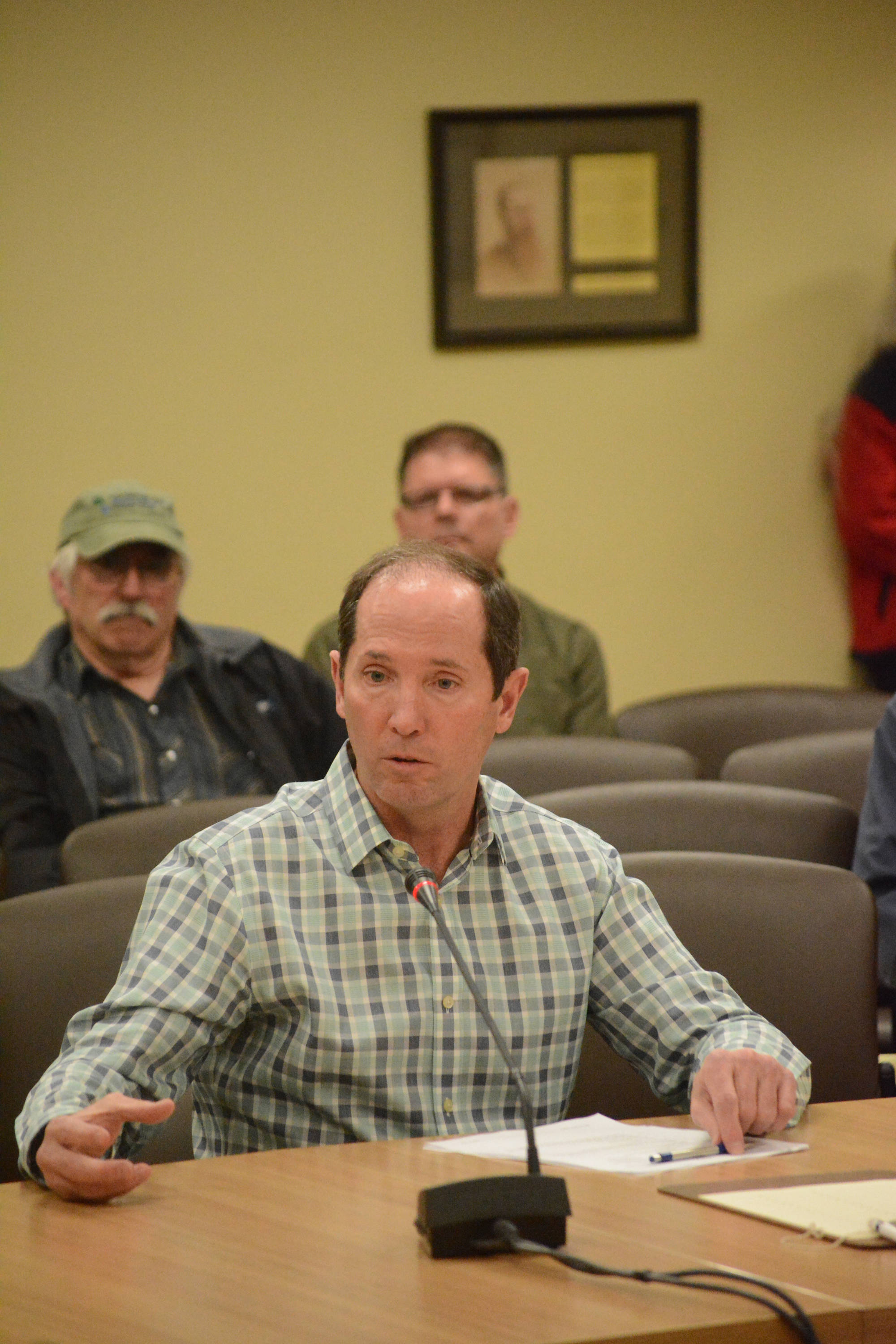Kenai Peninsula Borough Mayor Mike Navarre visited the Homer City Council at its Monday night meeting to field criticism over the borough’s recent property assessments in the Homer area, but also to defend the assessor’s model in calculating taxable property at the “full and true value,” as mandated in state law.
At issue was Resolution 17-040, “declaring the 2017 property tax assessments to be unfair in relationship to other borough communities and requests said assessments to be invalidated until the new tax model is fairly implemented borough wide.”
Council members Shelly Erickson, Heath Smith and Tom Stroozas introduced the resolution. As it turned out, they also were the only council members to support an amended version. In a 4-3 vote, with council members Donna Aderhold, David Lewis and Catriona Reynolds voting no, Mayor Bryan Zak broke the tie and also voted no, defeating the resolution.
In the Committee of the Whole, Navarre came to the table to answer questions about Homer area assessments. Assessments released on March 1 have drawn sharp criticism, with many property owners saying their land doubled in assessed value. As a reflection of criticism over assessments, Navarre said that 791 parcels were canvassed after citizens raised questions, and that 520 appeals to the Board of Equalization were filed before the March 30 deadline. Of those, 400 appeals are still open. Those that cannot be resolved through discussions with property owners and the assessor’s office go the to BOE. The board will meet in Homer sometime next month at a time and place to be announced, Navarre said.
Roxanne Lawver, who testified at the Committee ofthe Whole, offered a good example of the change in assessment. She said she has a “peekaboo view” and has made no improvements to her property. Her property almost doubled in assessed value. According to online tax records, her lot went up from $26,500 to $44,100.
Other people testifying spoke of similar changes. Steve Todd, speaking on behalf of his family who own many nearby properties, said properties were not treated equally.
“I have seen values that far exceed what the real market value is in Homer,” he said. “I would contest the fact that this model accurately represents what’s going on in the market place in Homer.”
In answering a question from Stroozas as to why Homer was picked on this year, Navarre said part of the recent jump in assessments has to do with assessors focusing on Homer as part of a 5-year review of property values. Assessors physically inspect property, and often catch things like a new garage or addition. The last review was in 2011, with new assessments reflected in the 2012 roll.
Council members criticized a new model used to assess property. One change has been from assessing at 95 percent of the value to 100 percent of the value. The resolution alleged that extending natural gas to every lot in the city of Homer also affected assessments, but that wasn’t true, Navarre said. The value added by bringing in natural gas had already been captured. Lots outside the city that recently got natural gas through a USAD, or uniform special assessment district, did see higher assessments.
The assessments also got criticism because of a model that calculated the value of views on a scale of “no” to “excellent.”
“All that means is when they’re (assessors) looking at a parcel and valuing a parcel, it’s assumed the value of that parcel includes a view,” Navarre said.
Smith criticized the assessor’s office for the model it used. Navarre said assessors used models based on state and professional standards. Smith introduced and got passed an amendment asking that the borough “provide proof that this new modeldoes provide fair and true assessments and is being implemented fairly throughout the borough.”
“When they (assessors) can’t explain the model and they can’t prove to use what they’re producing has fair market value, some if it seems arbitrary,” Smith said.
Smith also asked if assessors would be willing to meet in a work session to explain the model to the council. Navarre told the council that would be hard to do while the appeal process is going on, but he later told the Homer News that he would be willing to do that sometime this summer.
In speaking to the practicality of the resolution, Navarre said it would have no effect on him. Even if he wanted to, Navarre can’t change the assessment process now.
“Passing this, what is it really saying? It says that some people in Homer are frustrated and upset about their assessment notices,” he said. “The reality is there is no provision to toss everything out. You may make some of your residents feel like they’ve accomplished something, but the real impact to the borough is nonexistent.”
Navarre had some practical advice for the council. One problem with getting accurate assessments is that Alaska is a nondisclosure state, meaning sales of property are not mandated to be reported. Assessors get information on what homes and property sell for from questionnaires voluntarily returned by buyers or sellers.
“If the city would like to do something that would help, rather than pass a resolution like this, what you should be doing is passing a resolution that we should be a full-disclosure state,” Navarre said.


